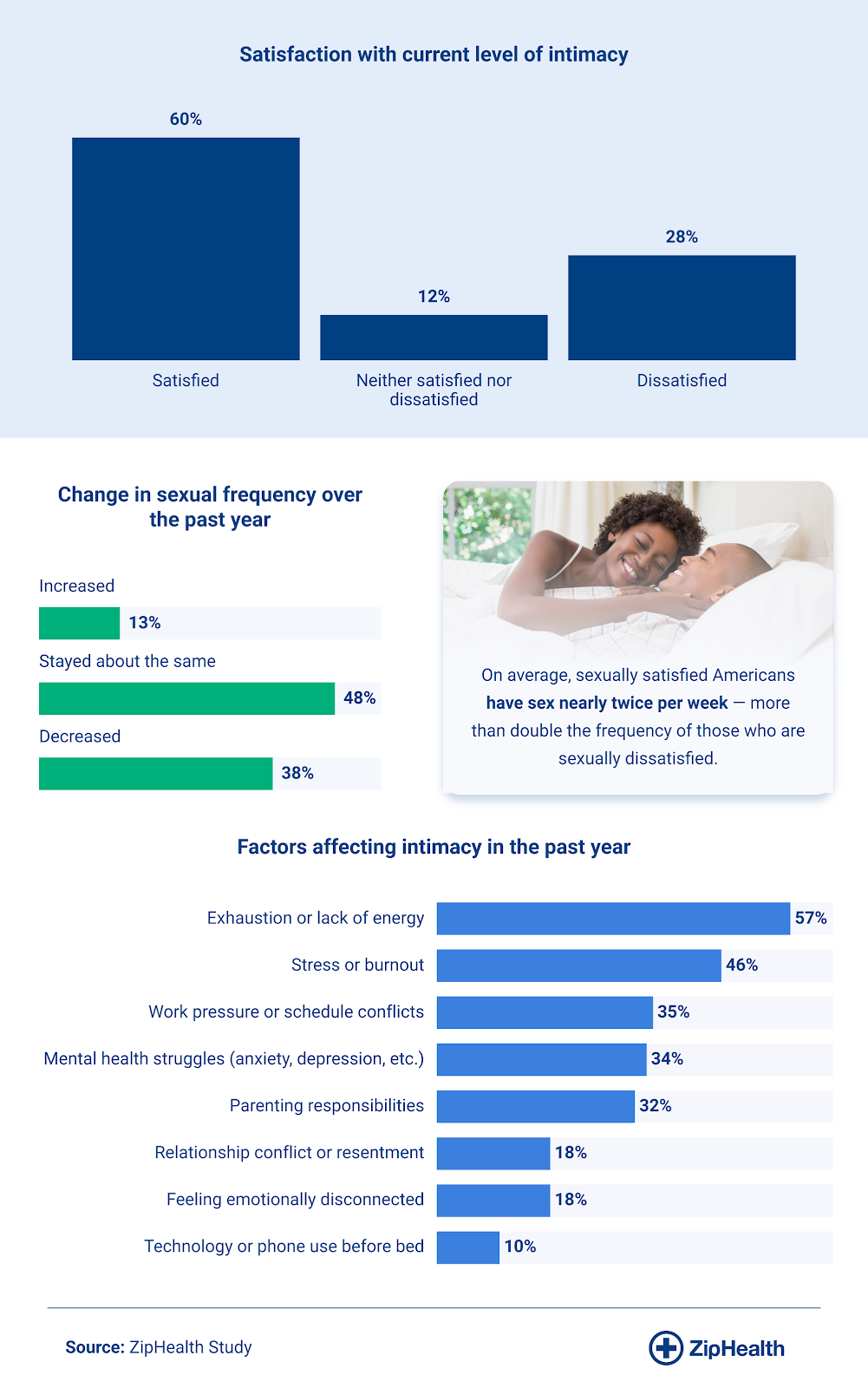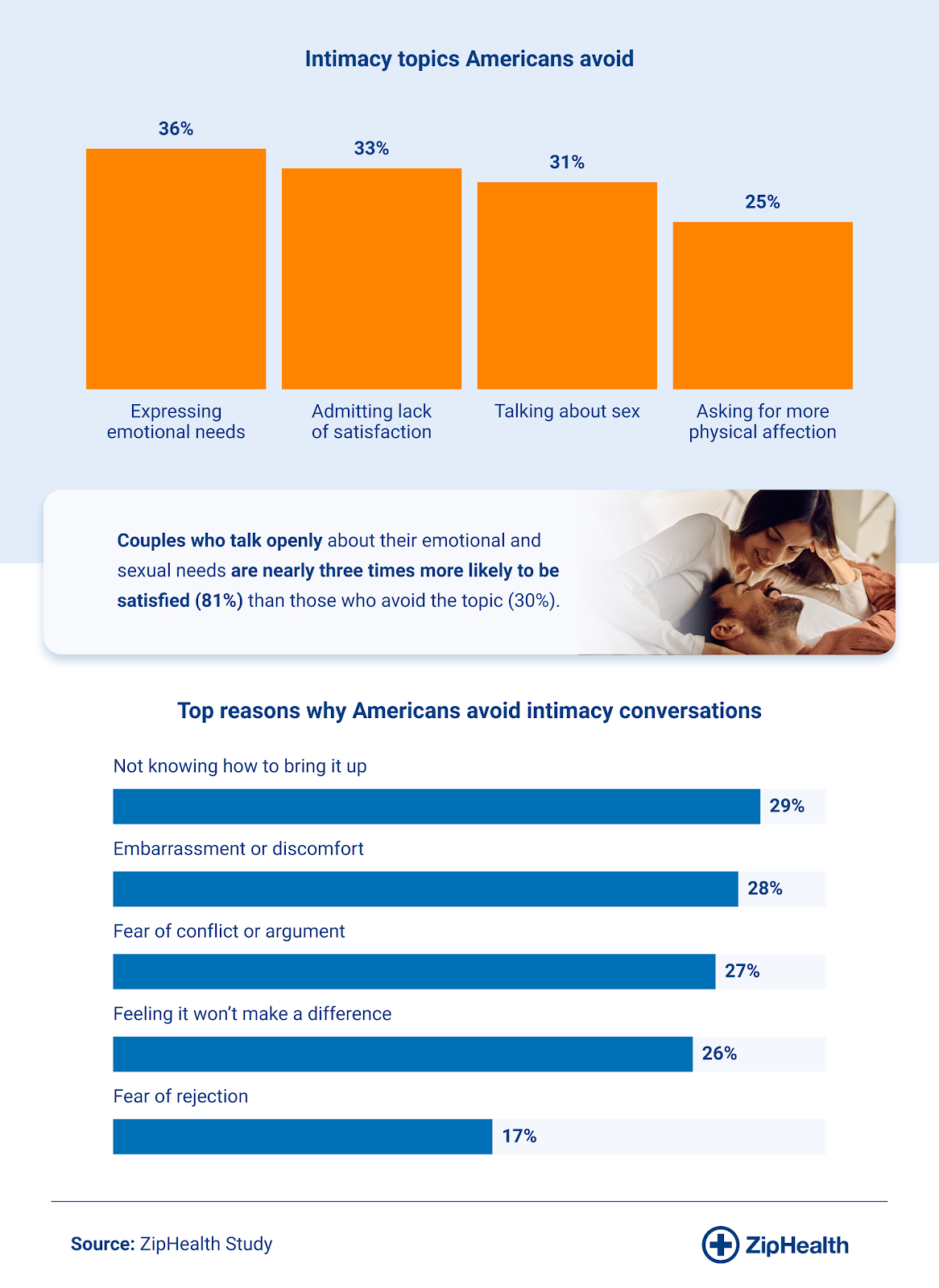The Intimacy Recession: How Modern Couples Are Losing Touch
Modern couples face an intimacy recession. Discover how stress and silence are reshaping love.

In relationships today, affection and connection often compete with exhaustion, stress, and screens for attention. ZipHealth surveyed 1,000 partnered Americans to uncover the state of emotional and physical closeness in long-term relationships, and the findings reveal a quiet but powerful "intimacy recession." From falling sexual frequency to communication breakdowns, the data paints a picture of couples who love each other deeply but are struggling to stay connected in the ways that matter most.
Key takeaways
- Over 1 in 4 Americans are dissatisfied with their current level of intimacy.
- Nearly 2 in 5 Americans report a decline in sexual frequency in the past year.
- Sexually satisfied Americans have sex about twice a week, on average, more than double the frequency of those who are dissatisfied (less than once a week).
- When they feel emotionally disconnected from their partner, over 1 in 10 Americans (15%) admit they avoid talking to them about it.
- Couples who talk openly about their emotional and sexual needs are nearly three times more likely to be satisfied (81%) than those who avoid the topic (30%).
The slow fade of physical intimacy
When it comes to physical closeness, many couples are quietly drifting apart. Despite affection and love remaining strong, sexual frequency has taken a noticeable hit in the past year.

On average, Americans reported having sex about 6 times per month, which is roughly 1 to 2 times per week, or around 73 times per year. Sexually satisfied Americans reported having sex about twice a week, on average, while dissatisfied couples had sex less than once a week. Nearly 2 in 5 (38%) said their sex life has declined in the past year, while only 13% reported having sex more often.
This dip seems to hit harder for couples who've been together longer. Satisfaction was highest in relationships less than a year old (78%) and declined steadily over time, leveling off to around 55% after 6 years. Overall, 28% of couples are dissatisfied with their current level of intimacy.
Younger generations, though more sexually active, aren't immune to a decline. Gen Z couples average 7 encounters per month, compared to 6 among millennials and 4 among Gen X and baby boomers. Across all age groups, couples reported that intimacy began to noticeably decline around the 6-year mark of their relationship.
Why intimacy fades over time
When asked why intimacy decreased, 57% cited exhaustion, while 47% pointed to stress or burnout. About a third said mental health struggles or a lack of time and privacy were to blame. Parenting demands (31%), emotional distance (31%), and health-related changes (30%) also played major roles. Even boredom (24%), job stress (22%), loss of attraction (16%), or increased phone use (14%) were enough to chip away at physical closeness.
About half of Americans (48%) described their relationships as emotionally close but physically distant, and for some, the disconnection runs deeper. Fourteen percent said their relationship now feels "more like roommates than lovers," a sentiment most common among millennials (14%) and Gen Z (9%).
At ZipHealth, we see how stress, health changes, and shifting priorities can quietly affect physical intimacy. That's why we support judgment-free access to treatments and tools that help couples reconnect at their own pace.
How disconnection shows up in modern relationships
Even in strong relationships, it's easy to feel out of sync. Whether it's sleeping apart, drifting emotionally, or feeling pressure to keep up with social media, many couples are quietly navigating the gap between closeness and distance.

Over 1 in 10 Americans (13%) reported having a "sleep divorce," meaning that they regularly sleep in separate beds. Nearly a quarter (23%) felt it hurt intimacy. These couples reported having sex less than average, about three times per month or roughly once every 10 days. But for some, better rest brought better balance, with 35% saying sleeping apart improved their connection by reducing tension and helping them recharge.
The reasons for this arrangement vary widely. Over half (52%) said they simply sleep better apart, while 41% pointed to snoring or movement issues. Others cited temperature or comfort differences (32%) or mismatched schedules (27%). Another 18% admitted that sleeping separately decreased physical closeness, while 16% said it reduced arguments, and 11% noted it made intimacy more intentional.
Disconnection can take many forms, from sleeping apart to silent emotional drift. We recommend couples explore solutions that fit their needs, whether that's better rest, more honest conversations, or support with sexual health concerns.
When pressure builds and conversations stall
External pressures can make intimacy even more complicated. Twenty percent of Americans said they feel pressure to maintain a "healthy" or "active" sex life because of what they see on social media. That number jumps among younger couples: 27% of Gen Z and 21% of millennials said influencer culture or online expectations make them feel they should be having more sex, compared to just 15% of Gen X and baby boomers.
Beyond the bedroom, couples also differ in how quickly they address emotional distance. Nearly half (47%) talk to their partner within a few days of noticing disconnection, while about a quarter (26%) bring it up right away. However, 12% wait weeks before addressing it, and 15% avoid the conversation altogether, a quiet pattern that can deepen feelings of isolation.
Talking openly makes a big difference. Couples who discussed their emotional and sexual needs were nearly three times more likely to be satisfied (81%) than those who avoided the topic (30%). Younger generations are leading the way in emotional openness. Most Gen Z (86%) and millennial (79%) partners said they talk about their emotional or sexual needs, compared to 68% of Gen X and baby boomers.
Open dialogue is one of the strongest predictors of intimacy and satisfaction. At ZipHealth, we believe sexual health starts with conversations, and we're here to make those easier, whether through resources, treatment access, or support without stigma.
Reconnecting in the intimacy recession
Every relationship goes through changes, but today's couples are facing a unique mix of stress, disconnection, and pressure that can quietly erode closeness. While there's no one-size-fits-all fix, the key often lies in small shifts like honest conversations, intentional intimacy, and the willingness to ask for support.
We believe that taking care of your sexual and emotional well-being is an essential part of feeling connected, seen, and supported in your relationship. No matter where you are in your journey, having access to the right resources can make intimacy feel possible again.
Methodology
We surveyed 1,000 Americans to explore the emotional and physical intimacy gap in modern relationships. The average age was 40; 45% were male, 52% were female, and 3% were non-binary. Generationally, 29% were baby boomers and Gen X combined, 55% were millennials, and 16% were Gen Z.
About ZipHealth
With ZipHealth, you can access discreet online health consultations and treatments for various conditions, including medications like Viagra and Sildenafil. We strive to provide accessible and convenient health care, ensuring you can manage your health comfortably and privately.
Fair Use Statement
This report may be shared for noncommercial purposes with proper attribution and a link back to ZipHealth. If quoting or referencing this study, please include credit to ZipHealth.
